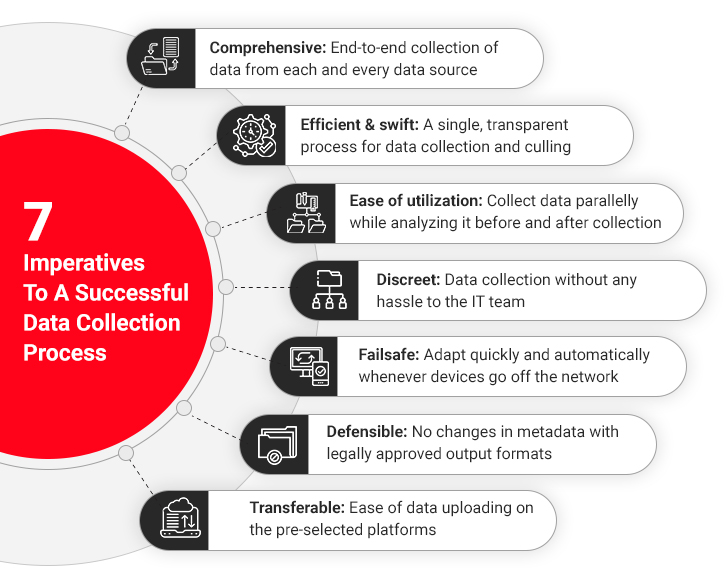Driven by the advent of eDiscovery, there has been a significant change in the nature of data. No longer does it look the same, nor does it stay exclusively in well-defined, disparate, and local data repositories. However, organizations still need data to improve their operations, products & services, and overall efficiency. This requires holistic data collection strategies that are highly effective and above all, legally defensible. But that alone won’t do it; when there’s an exponential surge in data volumes, organizations need data collection services and methods that will instantly chaff down the huge data volumes into something which is manageable, easy to comprehend, and easy on the budget. Apart from this, with growing time-bound regulatory compliance and litigation challenges, the need to have real-time insights into the disparate data sources can’t be stressed enough.
Keeping these challenges in mind, it is important for data collection companies in the USA to ensure that their data collection services meet the following criteria:
Explore The Seven Imperatives To A Successful Data Collection Process
Comprehensiveness: It is imperative for the modern data collection strategies to be comprehensive and they should have the capability to collect data from all important data sources, without any fail. Data sources may involve physical sources such as desktop computers, hard drives, and laptops; servers like Microsoft SharePoint; cloud sources such as Google Drive, Microsoft Office 365, Dropbox, Box, and Slack, and each and every kind of email format, be it archived or live, including Microsoft PST, Microsoft Exchange, IMAP, and POP3. The comprehensiveness of data collection methods ensures no data source is left behind, making datasets more inclusive, updated, reliable, leading to better insights.
Swiftness & Efficiency: Another imperative for any data collection methods is its ability to work faster and efficiently. By utilizing new-age search filtering, data can be culled during the data collect phase while leveraging global de-duplication to mitigate recollection of the data that has been already present in the datasets, and remove zero-byte files and machine files automatically from the collected data. This strategy ensures minimization of highly expensive, disproportional collection of data in regards to eDiscovery where the data review overheads is directly impacted by the data volume that needs to be reviewed. Additionally, better efficiency and speed of data collection methods also aids in detecting ground-breaking information, catalyzing investigations where time is of paramount importance.
Transform Your Data Collection with Modern Strategies
Ease of Utilization & Insights: Outsource data collection services to a data collection company that ensures collected data is neither non-intuitive nor cumbersome to use. In the modern-day scenario, it is vital for data collection methods to have a unified approach toward data collection from diverse sources, crawl several targeted data sources simultaneously to speed up data collection and allow the require criteria to be automated as well as templated. Moreover, the process of collection should be easily configurable to target the required data sources in sync with requirements. For instance, if the goal is to collect different sales contracts across the business, all parent contract folders can be the target. If the focus is on sales contracts of a single division or product, overcollection of data can be avoided by configuring and targeting only the folder of that specific division. Another prerequisite for a good data collection methodology is it should facilitate insights generation from the collected data. Through pre-collection analytics, the scope of data can be easily understood and with advanced search functionalities specific datasets within a network, cloud, or endpoint can be targeted on the basis of metadata, keywords, or hash value.
Discreet Processes: For any modern data collection strategy, disruption of everyday processes should be completely out of the equation. Data collection processes should be designed and deployed in such a way that they run silently in the background, without interfering with the core processes, bogging down the daily tasks, or maxing out the system as well as human resources.
Contingency Plans: Even when data is stored across disparate sources spread across different locations, unreliable connectivity cannot be contained. Due to this fact, it is important for data collection methods to maintain proper logs and documentation of the successfully completed processes and automate reattempt of any data collection that fails, for instance, if a device drops off from any network, the data collection solution should revisit the source to reattempt the collection.
Auditable Processes with Verified Results: Doesn’t matter what type of data collection methodology is implemented, it is of no use if the output changes the metadata or creates a broken custody chain. For the data collection to be efficient, it is critical for both the methodology and outputs to be auditable and reliable, with a strict adherence to the custody chain. The deployed online data collection method should generate data in legally approved formats to maintain the integrity of data collecting, including metadata without any alteration.
Ease of Output Transference: One of the main goals of data collection process is the empower business teams to review data in the most seamless manner. For that, it is vital to collect data in the industry-specific or business-specific format, which can be easily migrated to data platforms for further utilization. In order to cut expenses in terms of eDiscovery, the capability of a data collection methodology to easily and seamlessly migrate the collated data to analytical platforms is vital. Mitigating efforts and costs required to migrate data on to the business intelligence platforms is directly impacted by culling data during the data collection phase to ensure that only reliable and business-required data goes ahead for review.
End Note
With ever growing complexity of data formats, sources, and types, increase in popularity of remote work models and new regulations and compliance for data privacy, businesses require a new and foolproof approach toward data collection for various investigations. Such data collection services with a strategic approach facilitate organizations to collect diverse data from all data sources in the most efficient manner and store the collected data through an easy, seamless, and single process. Moreover, data collection processes should be efficient to cull data at the collection point to ensure that only valid and high-quality data is sent forward for review while empowering quick insights into the data scope. The entire process of data collection should be subtle enough not to overpower the daily activities and core operations while having contingency measures to handle any network disconnections and disruptions. Conclusively, the method should meet all legal compliances and regulations and must provide output in the most widely industry accepted format to ensure easy processing. For data collection services, adherence to these seven fundamental strategic requirements guarantees compliance with the new mandates of the data management industry.
7 Things To Consider Before Outsourcing Data Collection Services








